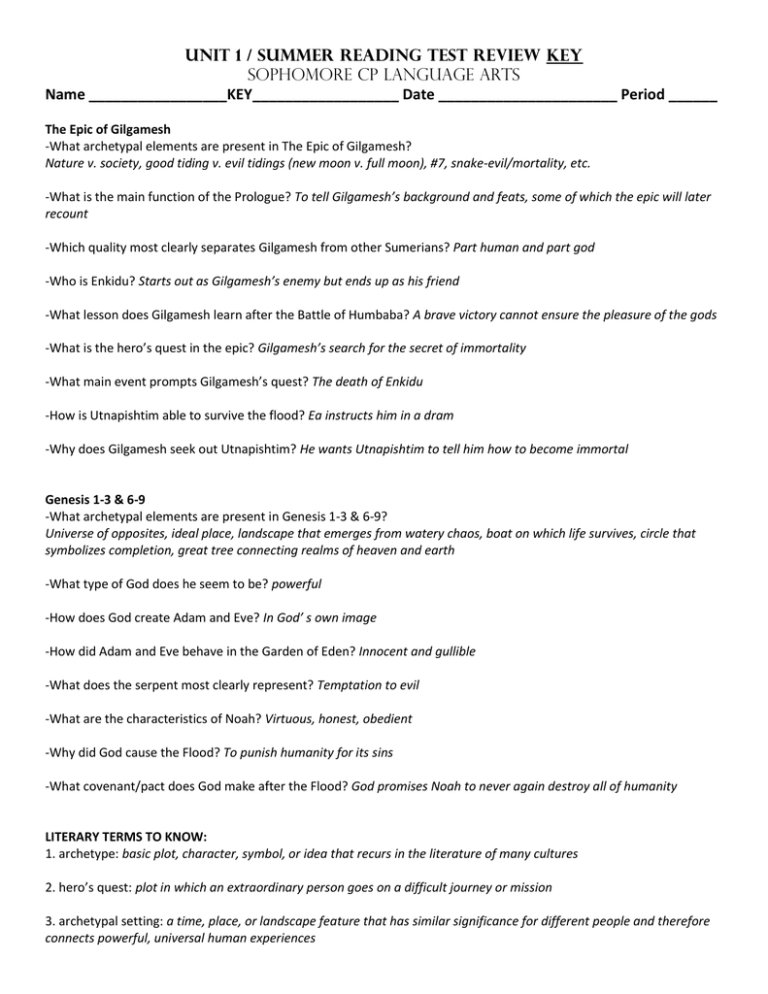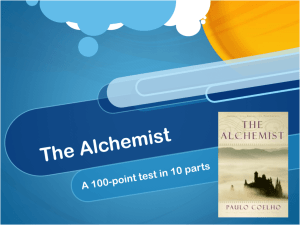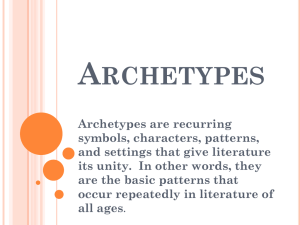Unit 1 / Summer Reading Test REVIEW KEY
advertisement

Unit 1 / Summer Reading Test REVIEW KEY SOPHOMORE CP LANGUAGE ARTS Name _________________KEY__________________ Date ______________________ Period ______ The Epic of Gilgamesh -What archetypal elements are present in The Epic of Gilgamesh? Nature v. society, good tiding v. evil tidings (new moon v. full moon), #7, snake-evil/mortality, etc. -What is the main function of the Prologue? To tell Gilgamesh’s background and feats, some of which the epic will later recount -Which quality most clearly separates Gilgamesh from other Sumerians? Part human and part god -Who is Enkidu? Starts out as Gilgamesh’s enemy but ends up as his friend -What lesson does Gilgamesh learn after the Battle of Humbaba? A brave victory cannot ensure the pleasure of the gods -What is the hero’s quest in the epic? Gilgamesh’s search for the secret of immortality -What main event prompts Gilgamesh’s quest? The death of Enkidu -How is Utnapishtim able to survive the flood? Ea instructs him in a dram -Why does Gilgamesh seek out Utnapishtim? He wants Utnapishtim to tell him how to become immortal Genesis 1-3 & 6-9 -What archetypal elements are present in Genesis 1-3 & 6-9? Universe of opposites, ideal place, landscape that emerges from watery chaos, boat on which life survives, circle that symbolizes completion, great tree connecting realms of heaven and earth -What type of God does he seem to be? powerful -How does God create Adam and Eve? In God’ s own image -How did Adam and Eve behave in the Garden of Eden? Innocent and gullible -What does the serpent most clearly represent? Temptation to evil -What are the characteristics of Noah? Virtuous, honest, obedient -Why did God cause the Flood? To punish humanity for its sins -What covenant/pact does God make after the Flood? God promises Noah to never again destroy all of humanity LITERARY TERMS TO KNOW: 1. archetype: basic plot, character, symbol, or idea that recurs in the literature of many cultures 2. hero’s quest: plot in which an extraordinary person goes on a difficult journey or mission 3. archetypal setting: a time, place, or landscape feature that has similar significance for different people and therefore connects powerful, universal human experiences HERO’S JOURNEY IN THE ALCHEMIST #1: The Call to Adventure ✹ The hero receives a call to leave his or her normal life and face adventure. Santiago has a recurring dream about treasure in the Egyptian pyramids. #2: Refusal of the Call ✹Often the hero will initially reject the call to adventure due to the changes it would cause in his or her life. Santiago has grown accustomed to being a shepherd and if he leaves, the sheep might suffer without him. #3: Supernatural Aid ✹A mentor will present the hero with one or more talismans or artifacts that will aid them later in their quest. Melchizedek, the king of Salem, gives Santiago one white stone (Urim) and one black stone (Thummim) that help read omens. Also, the gypsy that interprets his dream can be considered supernatural aid. #4: The Crossing of the First Threshold ✹ The hero leaves the familiar behind and enters the unknown. Santiago sells his flock of sheep and takes a boat to Tangier in Africa, leaving his shepherd life behind. #5: Belly of the Whale ✹ The hero willingly crosses the point of no return. Santiago is too quick to trust and gets robbed of most of his possessions. He can’t buy a ticket back home and decides to not think of himself as a poor victim. #6: The Road of Trials ✹ The road of trials is a series of tests, tasks, or ordeals that the person must undergo to begin the transformation. He works for a crystal merchant in order to earn back some money. Then he joins a caravan and has to adapt to desert life. He journeys to an oasis while facing obstacles, getting one step closer to fulfilling his personal legend. #7: The Meeting with the Goddess ✹ The hero finds his or her true love or companion. Santiago experiences love at first sight when he sees Fatima by a well. #8: Temptation ✹ The hero is tempted to stray from his or her quest by some offer of personal gain. Santiago wants to stay with Fatima and believes she’s more important than his treasure. #9: Atonement with the Father ✹ The hero succeeds his or her master/father figure. Santiago meets the alchemist; Santiago is able to transform himself into the wind. #10: Apotheosis ✹ This stage is marked by the death or transition to a different plane of a major character. Santiago breaks off from the caravan and the alchemist to travel across dunes towards the pyramids. #11: The Ultimate Boon ✹ The hero reaches the final goal, gaining the final reward. Santiago knows the Language of the World and there’s some self-discovery. Also, he finds out where the Treasure is. #12: Refusal of the Return ✹Holding the reward, the hero does not want to return to his or her old life. Along the way, Santiago has experienced everything he might have dreamed of and he would be content with staying at the oasis with Fatima. #13: The Magic Flight ✹Escaping with the reward may not be simple, or the reward may hinder the act of returning. Santiago is beaten up by some men and they stole from him. #14: Rescue From Without ✹After the long ordeal of the quest or refusal to return, the hero may need to be rescued. Santiago’s dream saves him because the men don’t believe it’s true. #15: The Crossing of the Return Threshold ✹ The journey has changed the hero and he or she must learn to integrate this new knowledge with his or her old life. Santiago returns back home and he digs by a sycamore tree, where he finds a chest of coins and other jewels. If he hadn’t pursued his personal legend and listened to omens, his life would have been drastically different. #16: Master of Two Worlds ✹ The hero accepts his or her new place in the world and the responsibility that comes with it. Often this is responsibility the hero initially feared. Santiago has newfound knowledge of the Soul of the World and he knows how to communicate with the earth, yet he also loves Fatima. There’s a balance between the two. #17: Freedom To Live ✹With the journey complete and the hero integrated back into the world, he or she is now free to live his or her life as he or she sees fit. With his personal legend completed, Santiago can now go back to Fatima.



